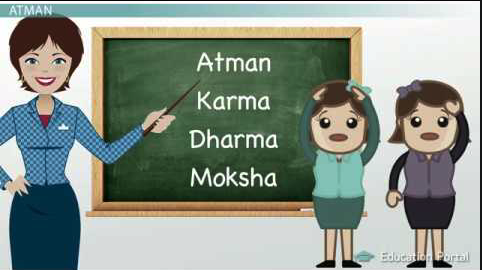Simple answers to your questions on Hinduism are provided here.
Use the search button (top right on desktop, top left on smartphones) to find specific topics of interest. At the bottom of each answer, check the “Tags” section for related topics. To learn more about this Q&A project, click [here].

On Hinduism
You can also download an earlier collection: 300QAs on Hinduism (PDF). Thank you.

24. Women in Hinduism
In Hinduism, women are considered equal in their pursuit of life’s goals: dharma, artha, kama, and moksha.
Hinduism acknowledges both masculine and feminine aspects of the divine, emphasizing the worship of the Divine in its feminine form. This recognition of the Divine as feminine, represented by Shakti, is a significant aspect of Hinduism.
However, despite these spiritual ideals, social practices have often deviated from the principles of gender equality as seen in ancient Vedic times. Like many cultures, Hindu societies have faced social inequalities that are being addressed over time.
Throughout history, there have been voices advocating against discrimination and misogyny within Hinduism. Women such as Mirabai and Akka Mahadevi are revered as spiritual leaders from past centuries. In contemporary Hindu movements, female leaders like Sharda Devi, Ammachi, Shree Maa, and others advocate for seeing the divine in all individuals, promoting equality and respect for all.
Other reading material: Short answers to real questions about Hinduism
HAF: https://www.hinduamerican.org/hinduism-short-answers-real-questions#Women
Video: An answer in a classroom,
Contributor: Rajeev Singh
Location of this post (24a): https://www.hinduspeakers.org/ufaqs/what-is-the-status-of-women-in-the-practice-of-hinduism/
The Ramayana is, perhaps first and foremost, the tale of a man who strives to constantly live up to his ideals but is forced to, like all of us, live in an unideal world. It is through this lens, then, that we may understand his choice to banish Sita, a choice that resulted from a situation in which there was no good option.
Rama’s people, mistakenly believing that Sita was “impure”, demanded that she be banished. As King of his people, Rama’s duty was to follow the will of the people as mandated by Hindu scriptures, whatever the will of the people may be (Indian kingship was much more democratic than European kingships, with the ideal Indian king simply serving as an executor of the people’s will rather than someone with absolute power). Thus, as the people demanded that his wife be banished, Rama faced a dilemma: to follow the duty of a husband and stand by his wife, or to follow the duty of a Dharmic king and obey his people. He chose the latter, giving an insight into the Hindu belief that the matters of the nation stand above one’s personal life, and also giving a poignant glimpse into the hardships that leaders face, perhaps even till this day.
What is important to note, however, is that while he decided to fulfill the duty of a king, he tried his level best to fulfill the duty of a husband as well: though he easily could have, he never remarried, and lived out the rest of his life dedicated to the service of his people.
Sita herself did not fault Ram Bhagwan. Her tears were for Ram Bhagwan’s pain to have to banish her and not for her own pain. She understood and sympathized with what he had to do. She was an exemplary bhakta of Bhagwan and a faithful wife. Sita passed the Agni Pariksha (fire test) but later prayed to Mother Earth (Bhūmi Devi), her divine mother, to take her back. The earth opened, and Sita was embraced by Bhūmi Devi. She disappeared into the earth, never to return.
This story serves as an example of how good people can be forced into situations where there is no right answer, and to Hindus around the world, provides some guidance for how to address these issues as well.
Other reading material: Bulbul @ New India Abroad, Many Ramayanas, Many Lessons A book by Anand Neelakantan,
Relevant videos:https://youtu.be/qA_Plb_Tspg?t=1596, https://www.youtube.com/watch?v=R_4s1eVLptA&list=PLWsnhdZKqEqyHyRAAO5P-mDnLg9mUlH1u&index=10 , Ami Ganatra on Sita, Dr.. Kumar Vishwas, Manoj Muntashir, Tilak video on Sita,
Contributor: Rutvij Horay
Location of this document (24b): https://www.hinduspeakers.org/ufaqs/why-was-sita-tested-by-rama
